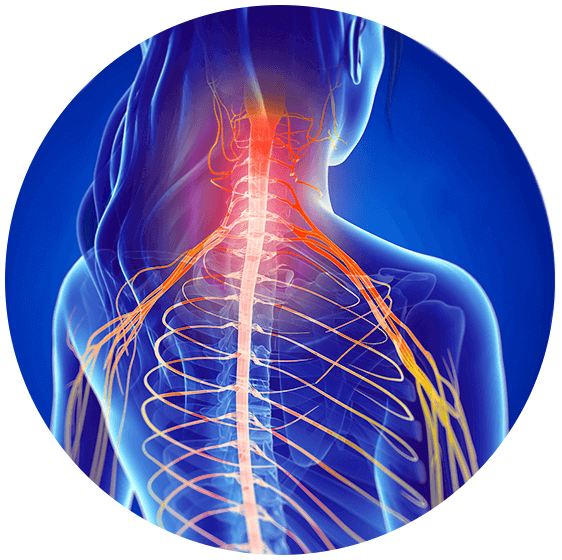Pinched Nerve

Pinched Nerve Symptoms & Treatment Options
Why is a pinched nerve such a common occurrence? Our spine houses some of the most important nerves in our body. It provides the major highways and off-ramps that allow our brain to communicate with the rest of the body. These crucial nerves include the spinal cord, which travels through the spinal canal. Our nervous system also includes the 31 sets of nerves that branch out from this central cord. Exiting from the spinal canal through openings in the vertebrae, these 31 pairs of nerves extend to all corners of the body.
Moreover, the spinal cord and its nerves play an important role in muscular movement, bodily monitoring, and everyday functions. Because these nerves travel through small openings within the spinal canal and vertebrae, they have many opportunities to become compressed by spinal structures. These tissues include muscles, tendons, ligaments, damaged intervertebral discs, and bones. When these nerves become compressed or pinched, a variety of troubling and painful symptoms may appear.
If you or someone you know is experiencing a pinched nerve, the following symptoms may emerge:
Concentrated pain, ranging from minor aches to incapacitating discomfort
Radiating pain or burning that can travel outward from the pinched nerve to adjacent limbs
Numbness or tingling sensations at the point of nerve compression or radiating out to limbs
Muscle weakness or spasms near the nerve or in adjacent muscles supplied by the nerve
Increased pain while holding certain positions, alleviated when shifting positions or stretching
In severe cases, paralysis or loss of bladder/bowel control can occur
Symptoms of a Pinched Nerve
Pinched, or compressed, nerves are a very common condition. In fact, pinched nerves are experienced by millions of Americans every year. The term “pinched nerve” indicates a condition with a range of symptoms which can present differently in different people. Pinched nerves can occur at any point in the spine. The intensity of the pain often varies depending on the location of compression and the nerves involved.
Although pinched nerves are a common occurrence, this does not minimize the pain and discomfort that they can cause. If you are suffering from any of the above symptoms, you can trust our experienced team at The Advanced Spine Center to help you heal. Pinched nerves can intensify over time. So, don’t wait until even more severe symptoms emerge.
Common Causes of a Pinched Nerve
We know that nerves can become pinched by surrounding tissues, muscles, and bones… But what causes these surrounding structures to rearrange and result in nerve compression? A variety of conditions, events, and circumstances can cause this shift. Some of these situations could include the following:
Bulging or Herniated Discs: When the disc protrudes from its typical location, pressing on adjacent nerves and causing inflammation and pain.
Bone spurs: Bony growths that occur near joints and can result in response to the inflammation caused by arthritis and bone-on-bone contact. Unfortunately, bone spurs can grow into nearby nerves, causing compression and related symptoms.
Chronic Strain: Individuals with jobs that result in continued use and strain on the back can lead to injury and degeneration of the structures of the spine. Careers such as construction, nursing, and athletics are just some example of physically demanding jobs that can lead to stress and injury of the back.
Arthritis: Arthritis leads to the degeneration of spinal cartilage and joints, causing compression of the joints. This can lead to spinal stenosis which can pinch nerves adjacent to the joints.
Pregnancy: Pregnancy leads to an increase in abdominal weight and results in additional pressure on many of the joints in the spine. This, along with the retention of water, can cause the normal spaces in the spine to decrease in size and compress nerves.
Body Positioning: There is hardly an individual out there who has not woken up with a pain in their back or neck from sleeping in an odd position. Although these types of pinched nerves can clear up on their own, laying or sitting in an unusual position for an extended length of time can sometimes lead to pinched nerve pain.
The above list of causes is non-exhaustive, representing only some of the possible causes of pinched nerves. If you think you are experiencing a pinched nerve, don’t wait to find relief. Contact our team at the Advanced Spine Center to evaluate your many options for treatment!